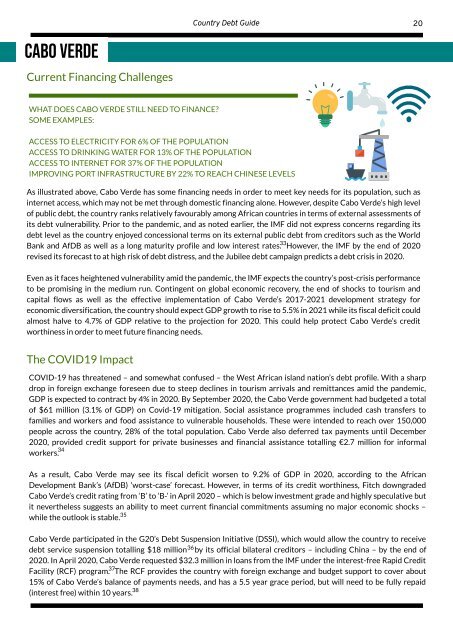You also want an ePaper? Increase the reach of your titles
YUMPU automatically turns print PDFs into web optimized ePapers that Google loves.
Country <strong>Debt</strong> <strong>Guide</strong><br />
20<br />
Cabo Verde<br />
Current Financing Challenges<br />
WHAT DOES CABO VERDE STILL NEED TO FINANCE?<br />
SOME EXAMPLES:<br />
ACCESS TO ELECTRICITY FOR 6% OF THE POPULATION<br />
ACCESS TO DRINKING WATER FOR 13% OF THE POPULATION<br />
ACCESS TO INTERNET FOR 37% OF THE POPULATION<br />
IMPROVING PORT INFRASTRUCTURE BY 22% TO REACH CHINESE LEVELS<br />
As illustrated above, Cabo Verde has some financing needs in order to meet key needs for its population, such as<br />
internet access, which may not be met through domestic financing alone. However, despite Cabo Verde’s high level<br />
of public debt, the country ranks relatively favourably among African countries in terms of external assessments of<br />
its debt vulnerability. Prior to the pandemic, and as noted earlier, the IMF did not express concerns regarding its<br />
debt level as the country enjoyed concessional terms on its external public debt from creditors such as the World<br />
33<br />
Bank and AfDB as well as a long maturity profile and low interest rates. However, the IMF by the end of 2020<br />
revised its forecast to at high risk of debt distress, and the Jubilee debt campaign predicts a debt crisis in 2020.<br />
Even as it faces heightened vulnerability amid the pandemic, the IMF expects the country’s post-crisis performance<br />
to be promising in the medium run. Contingent on global economic recovery, the end of shocks to tourism and<br />
capital flows as well as the effective implementation of Cabo Verde’s 2017-2021 development strategy for<br />
economic diversification, the country should expect GDP growth to rise to 5.5% in 2021 while its fiscal deficit could<br />
almost halve to 4.7% of GDP relative to the projection for 2020. This could help protect Cabo Verde’s credit<br />
worthiness in order to meet future financing needs.<br />
The COVID19 Impact<br />
COVID-19 has threatened – and somewhat confused – the West African island nation’s debt profile. With a sharp<br />
drop in foreign exchange foreseen due to steep declines in tourism arrivals and remittances amid the pandemic,<br />
GDP is expected to contract by 4% in 2020. By September 2020, the Cabo Verde government had budgeted a total<br />
of $61 million (3.1% of GDP) on Covid-19 mitigation. Social assistance programmes included cash transfers to<br />
families and workers and food assistance to vulnerable households. These were intended to reach over 150,000<br />
people across the country, 28% of the total population. Cabo Verde also deferred tax payments until December<br />
2020, provided credit support for private businesses and financial assistance totalling €2.7 million for informal<br />
34<br />
workers.<br />
As a result, Cabo Verde may see its fiscal deficit worsen to 9.2% of GDP in 2020, according to the African<br />
Development Bank’s (AfDB) ‘worst-case’ forecast. However, in terms of its credit worthiness, Fitch downgraded<br />
Cabo Verde’s credit rating from ‘B’ to ‘B-’ in April 2020 – which is below investment grade and highly speculative but<br />
it nevertheless suggests an ability to meet current financial commitments assuming no major economic shocks –<br />
35<br />
while the outlook is stable.<br />
Cabo Verde participated in the G20’s <strong>Debt</strong> Suspension Initiative (DSSI), which would allow the country to receive<br />
36<br />
debt service suspension totalling $18 million by its official bilateral creditors – including China – by the end of<br />
2020. In April 2020, Cabo Verde requested $32.3 million in loans from the IMF under the interest-free Rapid Credit<br />
37<br />
Facility (RCF) program. The RCF provides the country with foreign exchange and budget support to cover about<br />
15% of Cabo Verde’s balance of payments needs, and has a 5.5 year grace period, but will need to be fully repaid<br />
38<br />
(interest free) within 10 years.


